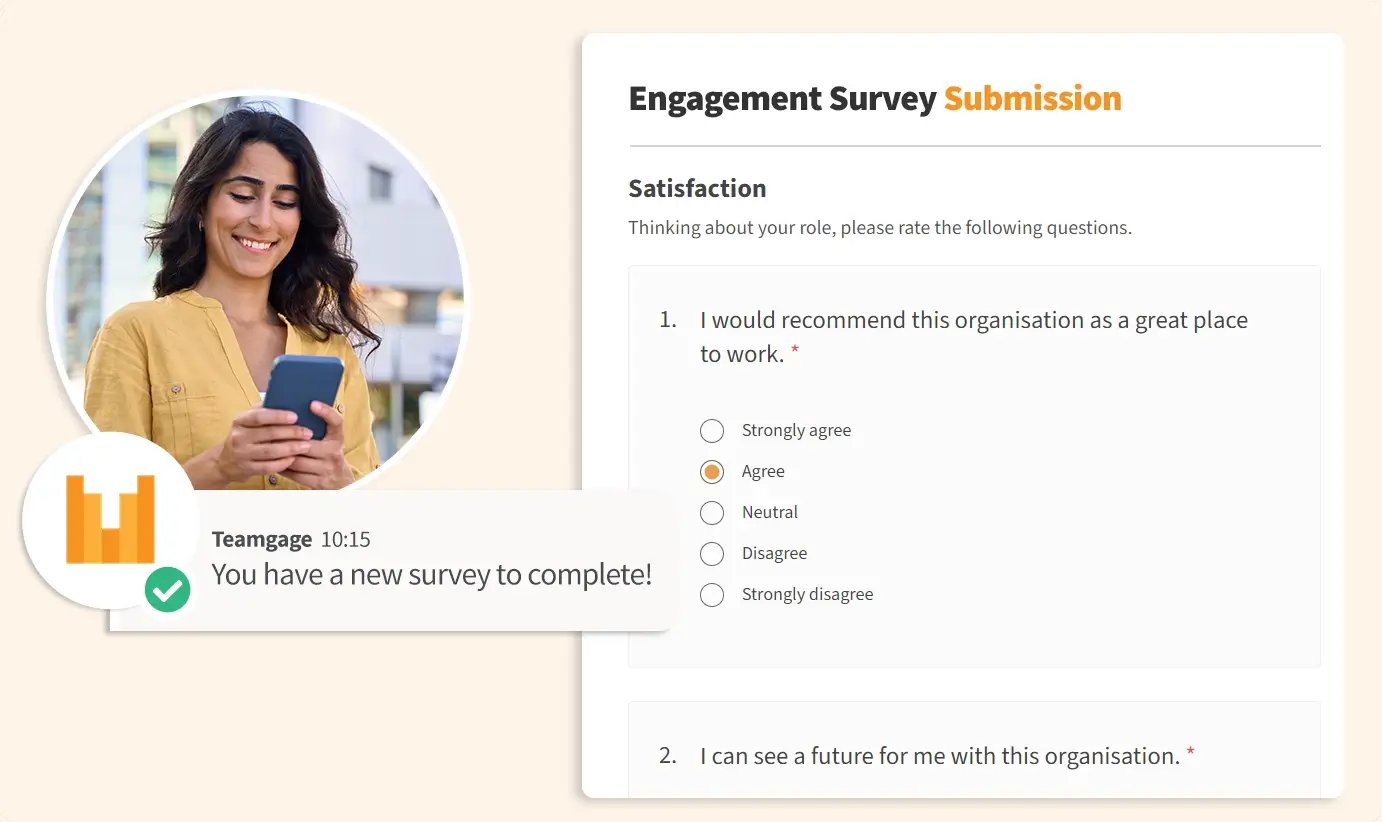Fragile to Agile
Fragile to Agile helps organisations design for change, building clarity, alignment and confidence in an increasingly complex world.

Through a proven architecture-led approach, they connect strategy, people, technology and execution so leaders can make better decisions and deliver meaningful outcomes faster.
From government agencies to global enterprises, Fragile to Agile’s work has shaped how organisations think about transformation, not as a project, but as a capability.
The mission
For Alan Evans, Chief Marketing Officer, and Warren Fenn, Chief Operating Officer, their mission is clear: help organisations adapt faster than the world changes around them. But to truly live that mission, Fragile to Agile knew they had to keep striving for agility gains within their own business.
Before Teamgage
Like many organisations, they'd started to notice that their employee feedback process wasn’t quite working. Formal feedback came once a year during performance reviews, which started to feel a bit disconnected from the day-to-day work. While the rest only really came through casual chats or friendly relationships, which worked in the moment, but didn’t paint a clear picture overall.
It was felt they weren't gaining enough consistent visibility and insights from their people to reliably and systematically act on.
That was the moment they decided to bring in Teamgage and start getting value from the whole platform.
In-depth baseline survey
The first step was getting a reliable baseline for employee feedback by building on our fully validated Employee Engagement Survey. With this researched set of baseline questions as a solid core, they could then add the context and specific questions they needed to get the right insights, without starting completely from scratch.
It proved to be a strong starting point and gave staff a safe, anonymous space to begin sharing more of their in-depth ideas and insights.

The survey delivered immediate visibility across a wide range of business areas and sparked useful conversations among the leadership team about where they wanted more quick, regular insights through Teamgage moving forward.
Gaining more real-time insights
This would take the form of a monthly pulse survey and with the help of our Teamgage experts, Fragile to Agile approved a set of pulse survey questions that focused on the areas that mattered most to them.
For example:
- Wellbeing at work
- Safety and trust
- Team collaboration
Each question was again tailored, helping them to “get more data on how good we really are.”
Regular insights roll in
At first, what really stood out was how feedback began to take shape around their real business themes, instead of more random suggestions.
People were actually using Teamgage to talk about the things that mattered most to the business, and that made the follow-up conversations “more focused and more productive”. It did take a little time for everyone to find their rhythm, but even the early feedback was more useful, actionable and appreciated by leaders.
As Warren Fenn points out so well:
“If every bit of feedback is treated as a gift and handled accordingly, it will increase the chances you get value from a solution like Teamgage.”
There was also a strong sense of familiarity. Some team members had actually used Teamgage before, either directly or through client projects, so getting started felt natural to many.
Engaging everyone
What proved trickier, was generating feedback across such a diverse mix of employees and contractors, and this challenge isn’t in any way unique to Fragile to Agile. While their employees may have all jumped in early, their contract workforce needed just a little more encouragement to get involved.
Building confidence
Everything we do within the Teamgage platform, from how it’s set up, to how teams are created, is designed to promote our values around anonymity. This helps people to know that they can be open and authentic with their feedback.
As Warren Fenn states:
"Teamgage is a true engagement and feedback platform that builds confidence with anonymity."
But that confidence does need time to develop. For example, in smaller teams within Fragile to Agile, some people were initially cautious about sharing too much detail, even though just a few thoughtful comments helped leaders “understand and nominate some actions.”
As Alan Evans points out:
“Ultimately, it all comes down to trust. People need to believe they can share honest feedback without fear of retribution. Teamgage is a useful lens on how people are feeling, but its real value comes when we pair the data with trust, context and genuine follow-through.”
It’s a great point, and as we’ve already heard, when leaders treat feedback as a gift and act on it where they can, confidence grows and trust in the process gets even stronger.
Positive outcomes
For Fragile to Agile, using Teamgage has already sparked some positive wins.
When communication came up as a focus area in one of their pulse surveys, it prompted action straight away. Leadership began sharing short updates after their monthly meetings, giving everyone more visibility into decisions and priorities. It was a small change, but it made people feel more connected, informed and heard.
In terms of greater visibility, Teamgage has provided clear insights into how the organisation is feeling each month. The engagement rates alone provide “useful insight” into how connected people are to key organisation initiatives, and the data and trends over time offer a clear picture of the progress being made.
Senior leaders can also now get the solid employee feedback and data they need to "escalate issues" more effectively and build a strong case for change. So instead of only referencing opinions or gut feel, they have the voice of their staff backed by real data and numbers to help them make steady, meaningful progress on the things that matter most.
Positive intent
We know across many clients, that having Teamgage in place, sends a strong message about an organisation’s commitment to improvement and culture.
As Alan Evans confirms:
“Using Teamgage reflects a genuine intent to improve our internal culture by capturing staff sentiment and feedback, and to use that insight to keep building a better workplace over time.”
For anyone considering using Teamgage, it's a reminder that real cultural improvement starts with being open to listen and then having the courage to act on what you hear.
What they say
“Teamgage gives you regular engagement and annual people data to complement your culture. It helps turn data and insight into actions for leaders to deliver meaningful improvements to the organisation.”
Warren Fenn
Chief Operating Officer, Fragile to Agile




